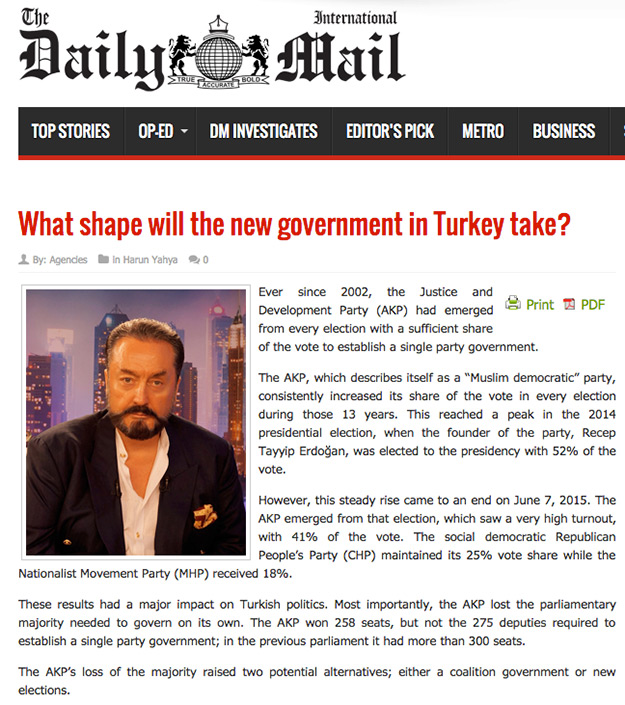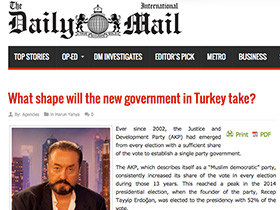
Ever since 2002, the Justice and Development Party (AKP) had emerged from every election with a sufficient share of the vote to establish a single party government.
The AKP, which describes itself as a “Muslim democratic” party, consistently increased its share of the vote in every election during those 13 years. This reached a peak in the 2014 presidential election, when the founder of the party, Recep Tayyip Erdoğan, was elected to the presidency with 52% of the vote.
However, this steady rise came to an end on June 7, 2015. The AKP emerged from that election, which saw a very high turnout, with 41% of the vote. The social democratic Republican People’s Party (CHP) maintained its 25% vote share while the Nationalist Movement Party (MHP) received 18%.
These results had a major impact on Turkish politics. Most importantly, the AKP lost the parliamentary majority needed to govern on its own. The AKP won 258 seats, but not the 275 deputies required to establish a single party government; in the previous parliament it had more than 300 seats.
The AKP’s loss of the majority raised two potential alternatives; either a coalition government or new elections.
Public opinion polls reveal that there would be no great change in the figures if new elections were to be held. No extraordinary developments that might alter the share of the votes have occurred in the last month since the election. There has not been a significant reduction in the talk of a presidential system, which many people found quite alarming and led to the aforementioned drop in the ruling party’s share of the vote. It would be unrealistic to expect any very different outcome from new elections if the same mentality is maintained.
The deputies, on the other hand, who have just been elected to Parliament following a protracted and grueling process are, in all likelihood, not at all keen to see another election either. All four of the parties that won the right to representation in Parliament in the 2015 election have stated that they do not favor new elections. Early elections in Turkey will therefore only enter the equation if there is “no other way out.”
In order to properly evaluate the coalition options, we first need to accurately interpret the results of the election. The AKP emerged as the largest party with 41% of the vote, but that was down 8% compared to the previous election. Polls and statements by party managers show that the main reason for the decline in the AKP vote is the “threat of the country being broken up.”
Some two million AKP voters realized that if the party’s pledge, one which dominated the election, to “convert the parliamentary system in Turkey to a presidential one,” were to be made a reality the country would be broken up into federations, and voted instead for the MHP, which favors a unitary state structure, thus blocking any change of system or fragmentation in Turkey.
Another loss in the AKP vote share occurred in the provinces of the Southeast, with their Kurdish-origin populations. Concessions to the PKK – albeit unwillingly – under the name of the “peace process” led to the HDP, which is openly backed by the PKK, dominating the region. Most ballot boxes in the region were under the shadow of the gun. The KCK and the YDG-H, extensions of the PKK, closely watched the voting and prevented, at gunpoint, votes going to any party other than the HDP. Indeed, the HDP received 100% of the vote from many polling stations, even with more votes than the actual number of electorate in some villages. It was clear that this picture, which in no way reflected the free will of the electorate, was the product of threats and intimidation. Indeed, information from the region and the existence of threatening letters addressed to the public confirm this.
Threats dominated the region not only during the electoral process, but also before it. Prior to the elections, the PKK set up local courts and roadblocks where ID checks were carried out, attacked worksites, demanded money under the guise of taxes, kidnapped young people and martyred village guards and soldiers. Every day the massage was sent out that “There is no state presence here, only us.” This terrified the people of the region, and prevented them from voting in line with their free will.
The main reasons for the drop in the AKP’s vote share, summarized above, show how the new coalition to be established in Turkey can be successful and lasting: The new coalition government must eliminate all concessions that might lead to the break-up of Turkey and make a determined stand on the subject. The government must preserve the parliamentary system, restore public order in the Southeast and make the state’s presence felt there.
In my opinion, this simple formula, the product of the electors’ preferences, is completely in line with Turkey’s interests. There is no need to say what a free and strong Turkey governed under a parliamentary democratic system, that preserves national integrity and ensures public order by showing the power of the state might do.
The only coalition model that appears to conform to that formula is an AKP-MHP coalition. These two parties represent very similar grass roots. The nationalist- conservative vote is divided between these two. The two parties’ grassroots therefore hope that a coalition will be established between them.
An alliance between these two parties has the potential to put an end to PKK terror, which has long afflicted the country. With its backing for the current unitary structure and its nationalist stand, the MHP will put a brake on the pressure being brought to bear on the government to create a federation. The deterrent power of the state against that terror organization will be emphasized, and there will be a change of power and language that will eventually unite the public. The state authority that has been lost in the Southeast will be rebuilt, and order and lasting peace will be brought to it. At a time when the danger is so great, it is essential for Turkey to establish a coalition government between the AKP and MHP without further delay and to deal with the PKK threat that so dominates the Southeast of the country.
Adnan Oktar's piece on Daily Mail:
http://dailymailnews.com/2015/07/23/what-shape-will-the-new-government-in-turkey-take/


